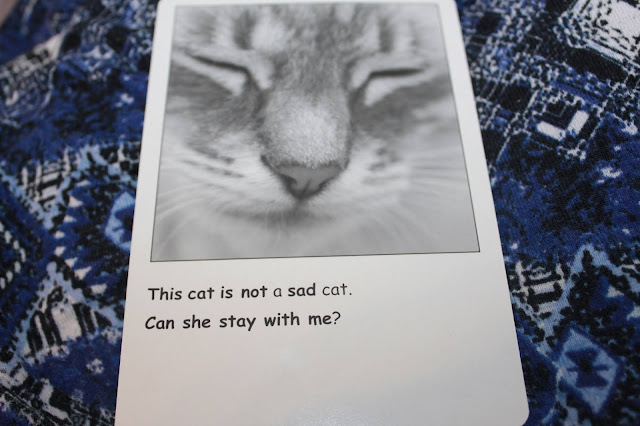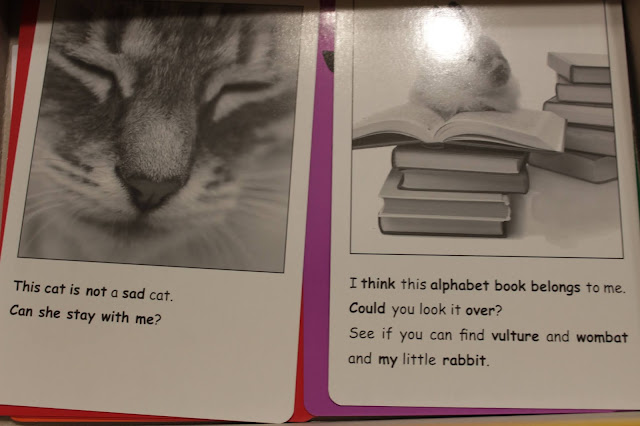Disclosure: I received this product free through the Homeschool Review Crew.
As a home educator and tutor, I am always interested in quality resources to enliven lessons and strengthen reading skills. Thus, I was excited about the opportunity to review The Reading Game, 2nd Edition from Allsaid & Dunn, LLC.
The 180 words include words from the Dolch Word List for Pre-K through 1st grade and from the Fry List (the100 most commonly used English words) and are first presented to the child through color-coded, leveled Memory-Match game cards, and, then, included on captioned picture cards, and in specifically written illustrated readers.
How Do You Play The Reading Game?
You - or any parent, teacher, tutor, or older child that can read - plays Memory Match with your child using the first set of red cards (10 cards of five matching words). As you play, you read the words aloud so your child can both see and hear the words.
Then, once your child has mastered this first set of cards - demonstrating an ability to read them during the game without hesitation, the next set of ten cards is used for playing Memory Match.
Once the second set of cards is mastered, you give your child the red picture card labeled 1-2 and your child tries to read its caption. (The card contains words that have been learned.)
If your child struggles with the picture card, you celebrate whatever your child had success with, and, then, play more rounds of Memory with the first sets of cards to reinforce with your child each of the 20 words previously presented.
If your child succeeds with reading the captioned card, you can move onto playing Memory Match with red word card sets 3 and 4. Then, try picture card 3-4.
After that, continue on through red card sets 5 and 6, reads the last red picture card, and, move onto reading the illustrated red book called, Skunk.
Of course, do not do all of this in one sitting. Simply play at your child's pace, picking up each time where you left off last time.
Following this pattern through the red, orange, yellow, green, blue, and purple sets of playing cards and corresponding picture cards and books, your child will learn 180 words and read those words in sentences on picture cards and in stories in the books.
What a low stress, fun, and systematic approach to early reading for typical learners!
The game can also be helpful for children with dyslexia and can tie into a phonics-based approach. (To see example phonics patterns found in the book, you can download the Rules Booklet online - which also comes in print form in your The Reading Game box.)
Is your child ready for The Reading Game?
If your child is a typical learner who is familiar with letters and shows an interest in storytime by pretending to read or wanting words pointed out while reading, then your child is ready to try The Reading Game.
If your child is a struggling reader who shows readiness as above but tends to need a more explicitly phonics-based approach, then you may wish to use the game slowly in addition to more intensive phonics-based instruction, for as you can see from the word list of the first book, the program jumps quickly from V-C and C-V-C word patterns to other patterns, plus sight words.
How Did I Use The Reading Game?
I have a 10 year old who is a typical learner and was curious about the game when we first received it, so I adapted the game material use for he and I to use during a couple 1:1 learning times. He moved quickly through the game materials, but enjoyed his foray with them, saying:
This game is under my level, so we adapted it. My mom had me spell each word and make sentences with the word cards. She also had me read the picture cards and stories fluently with expression. I liked reviewing with this game and think it would help younger kids.
We sometimes still take the word cards out and pull random ones to create silly sentences and stories.
My 13-year old is a struggling speller who just began to blossom with reading, so I also adapted the game materials for her use similarly. She said:
I like how this program has cards so if you wish, you can play games with it. I also like how it has the picture cards and books. I think that it would be nice for younger children to be able to play.
She also noted when reading the books quickly with me for fluency and expression that "some words have a dot in the middle" and asked why. I had her guess: Students just learning to read sometimes get thrown by compound words, so the makers of the material must have decided to divide the words for easier reading.
I also used the game with two of my tutoring students, ages 7 and 9, that have dyslexia. Both of these students were thrilled to see me pull out The Reading Game and, immediately, began laughing and smiling as we played 1:1 Memory Match with it as directed in the game instructions, with the small addition of me suggesting that whoever finds a pair must make a complete sentence using the word before keeping the pair and going again.
One of the girls definitely needed me to explain/hint at some of the phonics needed to read some of the sight words, so, for example, for the word "they", I pointed to the t-h and said, "Oh, t-h says /th/ and e-y here says 'ay'. So, that's they." Or, "Mmmm, w-h says /wh/ and the a here says /ah/, so this is wh-a-t." Both girls, though, progressed and, so far, have been able to read red cards 1-2, 3-4, and 5-6 with some help and, by their requests, tackled reading Book 1, too.
Further, both girls LOVED the back-and-white photos on the cards - guessing at what the captions would say before they read them - and equally enjoyed the illustrations in the book.
I have also pulled sentences from the picture cards and book for the girls to use for copywork and dictation sentences.
The girls quite enjoy The Reading Game and, even though some of the words presented in it are truly challenging for them, happily persist, learning as we go. One of them saw the game on my table the other day and exclaimed, "Oooo, I love that game. Are we going to play it?" (Of course, we did.) The other always comments on the cute animal photos and illustrations.
Would I Recommend The Reading Game?
If you are a home educator, teacher, or tutor, I would definitely recommend this game as a well-made, simple way to teach or reinforce reading, pending on if you are dealing with typical learners or those with challenges.
I always appreciate games that can be used again and again and are not parent/educator/tutor intensive. This is definitely one of them.
The materials are well made, the box is sturdy, directions for play/use are clear and simple, and success has already been had with my students.
Although I was not able to play the game on a daily basis with right-level learner yet, I can see how playing a few minutes a day could get a child from playing with word cards to reading within a week or so. For, with my tutoring students, we progressed from cards to the first within just a few sessions.
Further, six staged sets of memory games, picture cards, and storybooks can be revisited with older/more skilled learners, with random cards being pulled for sentence and story writing challenges, the picture cards being used as visual prompts for independent writing.
Plus, for those that need data-driven/reportable proof of learning, you can find pre- and post-assessments and class recording sheets online. These can also be printed - or the back of the book word lists referenced - for a quick look at which words have been presented.
Learn More
If you are the type that likes visual examples of things, find video demonstrations of The Reading Game online.
If you would like to see how other beginning or struggling readers have been enjoying some gameschooling and having chance to build confidence in reading through The Reading Game, click on over to the Homeschool Review Crew to find video, social media, and blog review from 25 families.
Finally, you can find The Reading Game on social media at
- Facebook: www.facebook.com/thereadinggame
- Twitter: @thereadinggame2 - https://twitter.com/TheReadingGame2
- Instagram: @thereadinggame - https://www.pinterest.com/TheReadingGame/_saved/
- Pinterest: @TheReadingGame -- https://www.pinterest.com/TheReadingGame/
- YouTube: www.youtube.com/thereadinggame













